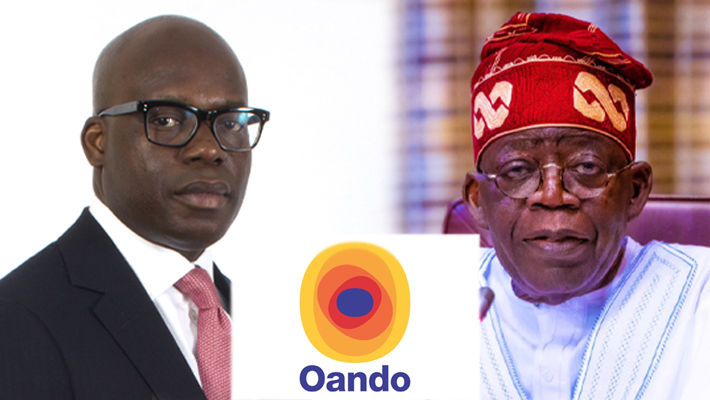Olayomi Koiki and Morakinyo Akinosun

A Nigerian oil company, Oando Plc owned by President Bola Ahmed Tinubu’s nephew, Wale Tinubu, has been shortlisted by the Trinidadian government as one of three final contenders to take over the country’s state-owned refinery, which was owned by the defunct Petrotrin.
The Trinidadian Finance Minister, Colm Imbert, made this known during a recent presentation of its national budget.
The defunct company is a state-owned oil company in Trinidad and Tobago.
Imbert noted that among the initial 10 proposals, three companies had made the final shortlist including, CRO Consortium, a consortium of three Trinidadian companies, INCA Energy, an American company, and Nigeria’s Oando Plc.
The bidding process began in February 2024, when the government of Trinidad and Tobago enlisted the services of US-based Scotia Capital to spearhead the refinery’s procurement by inviting “expressions of interest,” according to an available data.
“A formal selective Request for Proposals process will now be initiated to determine the winner among these three companies, to restart the refinery, if found feasible,” Imbert said.
He explained that the proposals received were evaluated based on five criteria which were, a clear restart plan and timeline by the proposing company. This restart plan and timeline had to include an asset integrity assessment, utility requirements such as power, natural gas, and water, as well as sources of crude supply.
Other criteria included a viable financing plan that covered working capital, and an agreement with the Trinidadian state oil company, Paria, that safeguarded the national interest in fuel security while addressing the management of Heritage’s crude supply. The criteria also included that the offeror demonstrated transparency and openness throughout the process, ensuring smooth information sharing to facilitate its completion.
The refinery located in Pointe-a-Pierre, Trinidad had been closed since 2018, when the country’s Prime Minister, Keith Rowley noted that the refinery was recording losses of up to $2 billion per annum.
Colm Imbert in his budget speech noted that the accumulated losses of the refinery as of the last audit was $15 billion, with the country carrying a public debt of $3 billion on behalf of the company. He also noted that when the refinery was shut down in 2018, it was battling with low productivity levels.
Trinidad and Tobago, just like Nigeria, is a crude oil-producing nation that relies on imported petroleum products for its energy demands.
According to reports, the refinery under review was built in 1917, making Trinidad the major oil supplier to the Caribbean region. In 1956, the owner of the refinery, Trinidad Leaseholds was acquired by Texaco, however, Texaco’s assets were nationalised in 1984.
In 1993, the Petroleum Company of Trinidad and Tobago (Petrotrin) was formed and formally took over control of the refinery. By 2018, the refinery was shut down and Petrotrin and broken into four companies, including Guaracara Refining Company which is now the holding company for the refinery as well as other assets offered for sale.
Nigeria imports petroleum products from Trinidad and Tobago, according to data from the National Bureau of Statistics (NBS).
Nigeria’s state-owned oil company NNPC Limited failed to revive petroleum production in the Port Harcourt Refining Company, after several missed deadline.
In August, Oando Plc just completed a $783 million acquisition of Nigerian Agip Oil Company (NAOC), thus increasing the company’s interest in the different joint venture assets. The acquisition has also given Oando control over 40 oil and gas fields, of which 24 are producing.
Its market value soared to record highs from ₦74 billion in 2023 to N1 trillion as of September 2024, indicating more than 1,000 per cent increase in valuation as Nigeria battled its worst cost-of-living and fuel crises.
While the West African country was recording an exodus of multinational companies like pharmaceutical giant GlaxoSmithKline (GSK), Microsoft, and Diageo (Guinness parent company) due to Nigeria’s harsh economic climate, Oando was leaving the league of companies generating billions of naira in revenue to 12 zeroes.
Oando —an average-performing oil company before President Tinubu’s government— recorded ₦74 billion profit after tax in the financial year ended 2023, a stark contrast to the previous year when it recorded a loss after tax.
But just a little over one year after Bola Tinubu became president, the company’s share price, which sold at six naira as of September 1, 2023, saw its market value rocket to an all-time high of ₦92.
The valuation elevated Oando to the top 10 most-capitalised companies on the Nigerian stock exchange.
According to a January 2024 report by Peoples Gazette, Tinubu was plotting to transfer Eni’s Nigerian assets to Oando in exchange for Eni’s repossession of Nigeria’s lucrative OPL 245 oil field in partnership with Shell.
The assets transfer was made public in August, by the parties, who said the deal was about $785 million and denied any wrongdoing of Oando cornering juicy deals at the expense of Nigeria’s oil field.
Wale Tinubu and Oando also denied any wrongdoing, asserting that some of the discussions that led to their latest successes took place long before his uncle assumed office.
